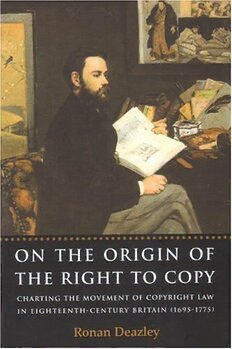
On the Origin of the Right to Copy: Charting the Movement of Copyright Law in Eighteenth-Century Britain (1695-1775) PDF
291 Pages·2004·0.975 MB·English
Most books are stored in the elastic cloud where traffic is expensive. For this reason, we have a limit on daily download.
Preview On the Origin of the Right to Copy: Charting the Movement of Copyright Law in Eighteenth-Century Britain (1695-1775)
Description:
Taking as its point of departure the lapse of the Licensing Act 1662 in 1695, this book examines the lead up to the passage of the Statute of Anne 1709 and charts the movement of copyright law throughout the eighteenth century, culminating in the House of Lords decision of Donaldson v Becket (1774). The established reading of copyright's development throughout this period, from the 1709 Act to the pronouncement in Donaldson, is that it was transformed from a publisher's to an author's right; instead, legislation initially designed to regulate the marketplace of the bookseller and publisher evolved into an instrument that functioned to recognize the proprietary inevitability of an author's intellectual labors. The historical narrative which unfolds within this book presents a challenge to that accepted orthodoxy. The traditional analysis of the development of copyright in eighteenth-century Britain is revealed as exhibiting the character of long-standing myth, and the centrality of the modern proprietary author as the raison d'?tre of the copyright regime is displaced, being replaced with a more nuanced account of legal change driven by complex interactions between the protagonists, resulting in a copyright regime which was quite different from that anticipated by the reformers.
See more
The list of books you might like
Most books are stored in the elastic cloud where traffic is expensive. For this reason, we have a limit on daily download.
